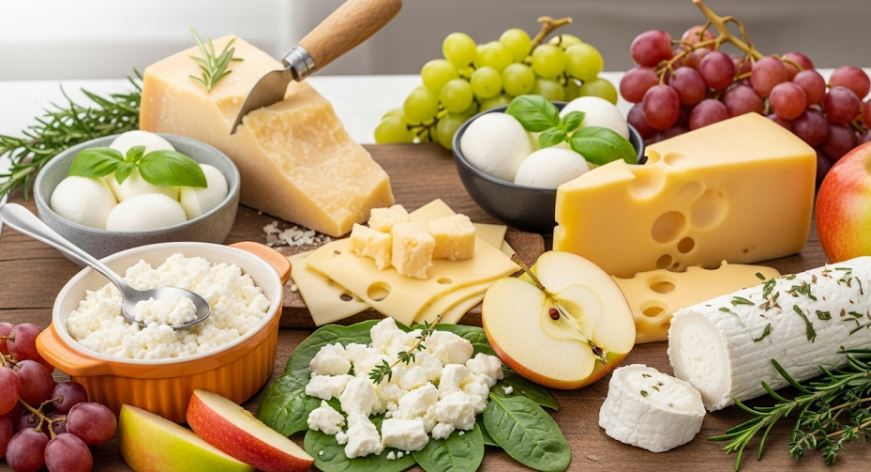
When you think of healthy eating, cheese might not be the first food that springs to mind. Often demonized for its fat and calorie content, this beloved dairy product frequently gets a bad rap in the wellness world. However, it’s time to set the record straight. Far from being an unhealthy indulgence, many cheeses are nutritional powerhouses, packed with essential vitamins, minerals, and proteins that can contribute significantly to a balanced diet. It’s all about making informed choices and appreciating the nuanced benefits each variety brings to the table.
For centuries, cheese has been a staple in diets across the globe, celebrated not just for its incredible versatility and flavor, but also for its ability to provide sustenance. Our ancestors instinctively understood its value, and modern science is now catching up, revealing just how beneficial certain types of cheese can be. So, let’s dive into the fascinating world of cheese and uncover why some varieties truly deserve a place in your healthy eating plan.
A Nutritional Powerhouse in Disguise
At its core, cheese is a concentrated source of nutrients derived from milk. This means it’s inherently rich in calcium, which is vital for strong bones and teeth. Beyond calcium, cheese delivers a hefty dose of high-quality protein, crucial for muscle repair, growth, and overall cellular function. For vegetarians, cheese can be an excellent alternative source of protein, offering a complete amino acid profile.
But the benefits don’t stop there. Many cheeses are also good sources of fat-soluble vitamins like Vitamin A, important for vision and immune function, and Vitamin K2, which plays a crucial role in bone health and preventing calcium accumulation in arteries. You’ll also find various B vitamins, including B12, essential for nerve function and red blood cell formation, along well as phosphorus, zinc, and selenium. It’s a veritable multivitamin in a delicious, savory package!
The Champions of Health: Cheeses to Embrace
Not all cheeses are created equal when it comes to their nutritional profile. While moderation is always key, some varieties stand out for their exceptional health benefits. Let’s explore a few of these unsung heroes:
Parmesan: The Umami-Rich Bone Builder
This hard, granular Italian cheese is not just a flavor enhancer; it’s a nutritional titan. Parmesan is incredibly rich in calcium – just one ounce can provide a significant portion of your daily recommended intake. Its low lactose content also makes it a good option for those with mild lactose sensitivities. Because of its hard texture, it’s also lower in moisture and thus more concentrated in nutrients. A sprinkle of Parmesan can elevate any dish while boosting your calcium intake without adding excessive calories.
Mozzarella: The Fresh, Light Option
Often associated with pizza, mozzarella, especially the fresh variety made from buffalo milk or cow’s milk, is a surprisingly healthy choice. It’s lower in fat and sodium compared to many other cheeses, and it’s an excellent source of protein and calcium. Fresh mozzarella also contains probiotics, beneficial bacteria that support gut health and digestion. Its mild flavor and versatility make it easy to incorporate into salads, sandwiches, or simply enjoy on its own with some fresh tomatoes and basil.
Swiss Cheese: The Heart-Healthy Choice
Known for its distinctive holes and nutty flavor, Swiss cheese (like Emmental or Gruyère) is another top contender. It’s naturally lower in sodium than many other hard cheeses, which is good news for blood pressure. Moreover, Swiss cheese is a fantastic source of protein and is one of the best dietary sources of Vitamin B12, vital for energy and nerve health. Some studies even suggest that certain compounds found in Swiss cheese, produced during the fermentation process, might have anti-inflammatory properties.
Cottage Cheese: The Protein Powerhouse
While perhaps not what first comes to mind when you think of „cheese,” cottage cheese is a remarkable health food. It’s incredibly high in protein, particularly casein protein, which is slow-digesting, making you feel full longer. This makes it a popular choice for athletes and anyone looking to manage their weight. It’s also relatively low in calories and fat, especially the low-fat varieties, and it contains beneficial probiotics. Try it with fruit, in savory dishes, or even as a base for dips.
Feta Cheese: The Briny Mediterranean Gem
This crumbly, salty Greek cheese made from sheep’s or goat’s milk is packed with flavor and nutrients. Feta is a good source of calcium and B vitamins. While it can be higher in sodium, it’s often used in smaller quantities due to its strong flavor, meaning you still reap the benefits without overdoing it. Its distinct tanginess adds a wonderful complexity to salads and Mediterranean-inspired dishes. Plus, the milk from sheep and goats is often easier for some people to digest than cow’s milk.
Goat Cheese (Chèvre): The Easily Digestible Delight
Goat cheese, or chèvre, is becoming increasingly popular, and for good reason. It tends to be lower in lactose and casein (the primary protein in cow’s milk) than cow’s milk cheeses, making it a more digestible option for many. It’s also a good source of protein, calcium, and beneficial fatty acids. Its tangy, earthy flavor works beautifully in a variety of dishes, from salads to tarts.
Beyond the Basics: Understanding Cheese in Your Diet
While selecting healthier cheese varieties is important, it’s also crucial to consider how you incorporate them into your diet. Portion control is paramount, as even the healthiest cheese still contains calories and fat. A typical serving size is around 1-1.5 ounces (about the size of your thumb).
Furthermore, the fat content matters. While full-fat cheese offers more fat-soluble vitamins and can be more satisfying, lower-fat versions can be a good choice for those monitoring their caloric intake. Look for cheeses made from grass-fed milk, as these often have a higher concentration of beneficial nutrients like Omega-3 fatty acids and conjugated linoleic acid (CLA), which has been linked to various health benefits.
Consider the fermentation process too. Artisan and aged cheeses often contain beneficial probiotics, which are fantastic for gut health. These live cultures contribute to a healthy microbiome, supporting digestion, nutrient absorption, and even immune function.
Finally, think about what you pair your cheese with. Instead of crackers loaded with refined carbohydrates, opt for fresh fruits, vegetables, or whole-grain options. A slice of cheese with an apple or a few grapes makes for a nutritious and satisfying snack.
Dispelling the Myths: Why Cheese Isn’t Always the Enemy
The misconception that all cheese is unhealthy often stems from its saturated fat content. However, emerging research suggests that the effects of saturated fat from dairy might be different from those from other sources. The „food matrix effect” proposes that nutrients consumed within a complex food structure (like cheese) interact in ways that differ from isolated nutrients. This means the overall nutritional profile of cheese, with its unique combination of fats, proteins, calcium, and probiotics, may mitigate some of the potential negative effects of saturated fat when consumed as part of a balanced diet.
Furthermore, cheese often contributes to satiety, helping you feel fuller for longer and potentially reducing overall calorie intake throughout the day. This can be a significant advantage for weight management.
The Art of Enjoying Cheese Mindfully
Ultimately, incorporating cheese into a healthy lifestyle is about balance, awareness, and enjoyment. It’s about choosing the right types, understanding portion sizes, and appreciating its incredible nutritional density. Don’t let old myths deter you from enjoying this wonderful food. With its rich history, diverse flavors, and significant health benefits, cheese can be a truly valuable and delicious addition to your diet. So go ahead, savor that slice of Parmesan, crumble some feta into your salad, or enjoy a scoop of cottage cheese – knowing you’re nourishing your body with every delightful bite.













